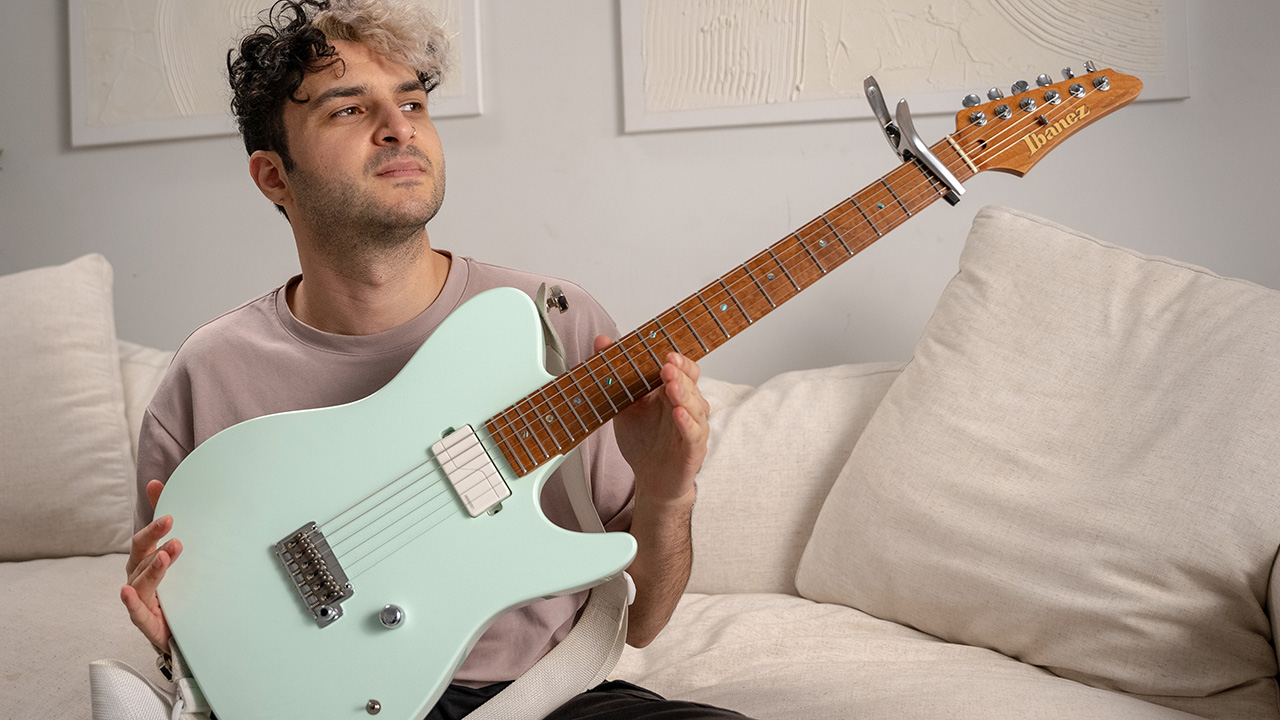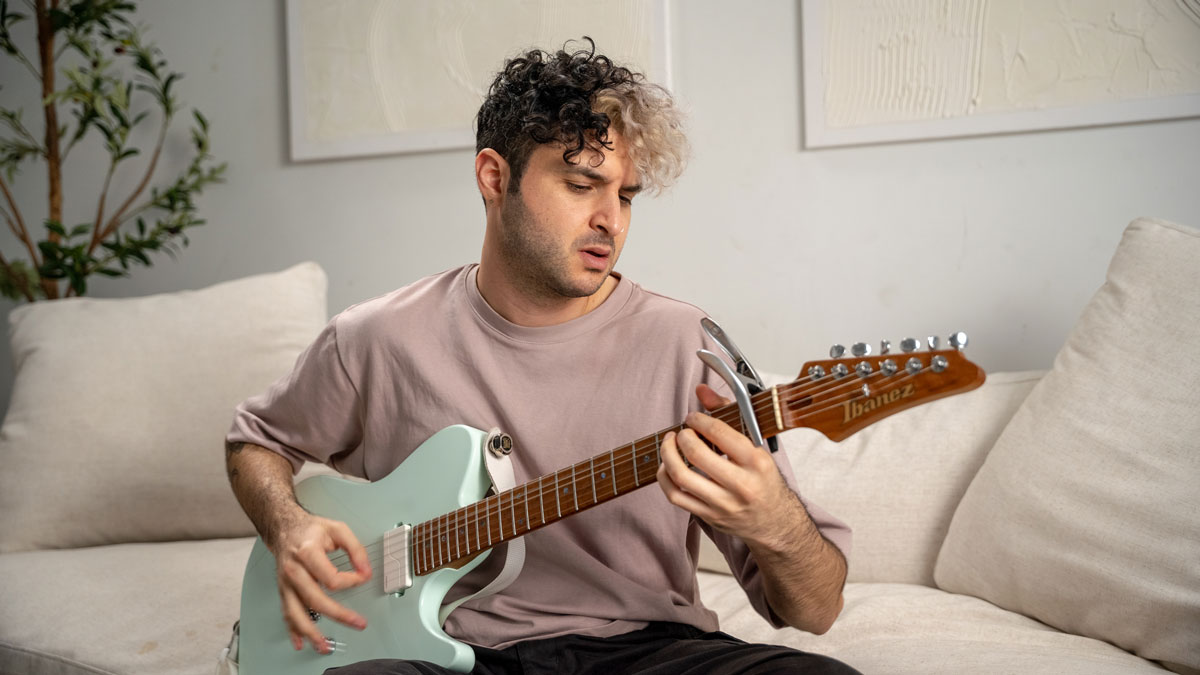
While the virtuoso world can sometimes feel like a deeply serious place, Standards architect Marcos Mena has perfected a uniquely light-hearted and fruity brand of pop-shred that will make your toes wiggle with pure joy and your jaw drop in pure astonishment.
If you didn’t think you could possibly dance to instrumental math-rock, then it’s time to take a trip into his happy, tappy guitar universe and think again. Having first caught attention with their Fruit Island debut back in 2020, Standards doubled down with an even juicier sophomore effort in the form of 2022’s Fruit Town.
Fruit Galaxy is now the latest opus from the Californian duo (the album features Moises Popa on drums, who was recently replaced by former Covet sticksman Forrest Rice).
Although the title might suggest a short thematic step from its predecessors (yes, they really like fruit), this fresh 11-track collection represents a giant leap forward in terms of scope and out-of-this-world creativity.
Armed with a custom Ibanez AZS2200 T-style guitar that’s been fitted with just one coil-splittable humbucker in the neck position, Mena is the sole provider of melodic and harmonic information in the band.
He’s developed a veritable arsenal of two-handed techniques that enable him to perform multiple roles at once. And he’s honed a versatile, often bottom-heavy, guitar sound that’s ideal for filling out space within the two-piece dynamic.
“I think of myself as the whole band – I’m rhythm and lead,” he explains, chatting while out on the road with fellow boundary-pushers Elephant Gym. “I use the neck pickup because one of my teachers – Nick Reinhart from Tera Melos – always taps on the neck pickup. So I started doing that, and I feel like it has more of a full sound, especially if you’re going to do the one-man-band sort of thing.”
Like a form of natural selection, Mena’s lack of use for bridge pickups has led to their gradual disappearance from the guitars he likes to play most. A few years ago, he ordered his first neck pickup-only custom build from Aristides, before partnering with Ibanez for another crack at the concept.
“It’s definitely my favorite guitar and also the one I get asked the most questions about, because people are used to seeing bridge-only guitars,” he smiles, acknowledging that his mint green main squeeze has raised a few eyebrows along the way.
“I asked Ibanez for a Telecaster with a single neck pickup. I was expecting them to make fun of me and say no,” he adds. “But they were like, ‘Yeah, we can give it a shot. We’re just warning you that we’re basically going to fill in where the bridge pickup is and then paint over it, so it might look bad!’”
The Fishman Fluence appointed instrument, however, turned out to be Mena’s “perfect guitar”. With just one switch for flipping between humbucker and single-coil voices and a single volume control, its uncluttered design helps clear the decks for his flying fingerstyle techniques.
From tapped harmonic toplines and ringing open chords, to full-fat riffs and nifty bass lines that slot in whenever there’s a digit going spare on either hand, Mena covers an immense amount of ground in every song.
“With the tapping, I’ll just run and hit a bass note real quick, and then I’ll be doing something else – or vice versa,” he says, casually downplaying the complexity of his polyphonic chops (which are just as fun to watch as they are to hear).
His approach is inspired by the way a pianist might comp with their left hand and perform melodies with their right, or the way a progressive acoustic fingerstylist might approximate an entire orchestra on just one guitar. But, to begin with at least, learning to multitask was just something Mena needed to do to get the band off the ground.
“I think if we had a really good bass player we’d probably be a better band,” he laughs. “But when it started, we never found anybody we felt was right. So it was literally born out of necessity. We’re this far into it though, and I think we’re doing pretty good!”
I just want to write music and elicit a certain emotion. Sometimes I’m not doing all of this crazy shred stuff
Mena adds that he’s learned that the mere suggestion of bass can be enough to propel a song along. “I don’t mind just having a bass note ringing out,” he explains. “It keeps it minimalistic, and I like doing the tapping to fill out some of the other space.
“Occasionally I’ll do something really crazy and go with all eight, but eight-finger tapping is not something you see super often, even with lead players. I think the way I look at it is more from a compositional standpoint than a guitar solo standpoint.”

True enough, amid all of his wild and wonderful techniques, the most compelling thing is that he values a good song above all else. “I struggle with knowing if I’m a shred guitarist or not – and it’s tough because I don’t necessarily write music just for guitar,” he muses.
“I just want to write music and elicit a certain emotion. Sometimes I’m not doing all of this crazy shred stuff. Moises is a very technical drummer with a lot of ability, so he inspired me to go back to the technicality. I wanted to bring that out again with this album – but in a way that’s not overly in your face. I’m not playing with a pick and doing scales, so it’s a different kind of busy.”
I played around a lot with bitcrushing. I was trying to stay busy not only on the guitar side, but also on the production side
Open tunings also help to conjure a naturally big sound, and Mena tends to favor open major keys that feel entirely right for songs named Pixelberry, Smashfruit and Holiday.
The guitarist-come-producer admits to a penchant for “music that feels very digital,” and says he pillages nuggets of inspiration from genres as far apart as hyperpop and glitchcore – as well as the odd Nintendo game soundtrack – which only adds to the fun-filled nature of the band.
“I’ve always loved breakbeat samples and stuff like that, and I played around a lot with bitcrushing,” he explains. “I was trying to stay busy not only on the guitar side, but also on the production side.
“I didn’t want Fruit Galaxy to sound like every other thing. So I was trying to do little things like flourishes on the guitar or adding sound effects. I wanted it to feel very much like a wild ride from all aspects!”
It’s a resounding Mission Accomplished on that front. But Mena also likes to self-impose a few restrictions on the seemingly limitless array of tones available to guitarists today, and describes himself as “not a pedal guy in comparison to guys who are really into pedals.”
At home, he’s content with profilers and Neural DSP plugins, and he keeps his touring ’board relatively streamlined: a selection of distortion, overdrive, compression and delay effects, as well as a DigiTech Whammy, the bitcrusher and an always-on bass pedal that he uses to split his signal and fill out the bottom end.
“There are so many pedals now that are like supercomputers,” he says. “When I got into guitar, you had Boss pedals. Those are pedals! Now, it’s like people are carrying around synths and they’re like, ‘Dude, check out this pedal! It loops backwards and then it pitches it up randomly. Look at the sound you can get!’
“And it’s cool, but it’s not like the guitar anymore. For me and my sound, I do like to have some effects, but I want it to be clear what they are.”
- Fruit Galaxy and Mena’s guitar transcription book for the album are available now.







